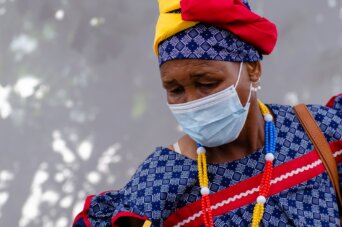- About
- Topics
- Story
- In-Depth
- Picks
- Opinion
- News
- Donate
- Signup for our newsletterOur Editors' Best Picks.Send
Read, Debate: Engage.
| topic: | Health and Sanitation |
|---|---|
| editor: | Bob Koigi |
At the height of the global vaccination drive against COVID-19, there was an uproar when developed nations were accused of vaccine apartheid and hoarding crucial supplies that made it difficult for developing countries to access much-needed help, even as the pandemic ravaged the world.
For these countries, especially those in Africa, it brought to the spotlight the urgency with which the continent needed to look inwards to find homegrown solutions to the numerous challenges that affect the healthcare sector.
From poor infrastructure, brain drain and exorbitant costs of accessing healthcare to the proliferation of counterfeit and substandard drugs, the African healthcare system has been on a rickety deathbed.
In about half of the African countries, over 36 percent of total health expenditure is from out-of-pocket payments, according to the Healthcare and Economic Growth in Africa report. In Uganda, a survey at a public hospital revealed that in order for patients to access medical care, 53 percent of them had to borrow money while 21 percent had to sell their possessions.
Yet 21 years ago, African leaders committed to allocate 15 percent of their annual budgets to improve healthcare, which included making it accessible and affordable in what is commonly referred to as the Abuja Declaration on Health. To date, only a negligible number has actualised this pledge.
It is sickening that Africa produces a paltry 2 percent of the medicine it consumes and has an estimated 42 percent of cases of substandard or falsified drugs. It can no longer be business as usual. The right to health belongs to everyone. In the words of former-UN Secretary General Kofi Annan, “Health is not a blessing to be wished for but a human right to be fought for.” African leaders have a responsibility to their citizens to expand safe, timely access to quality medicines.
Which is why the baby steps being made in the continent must be lauded.
The Africa Medicine Agency (AMA), whose establishment marks a crucial step for the continent to have a coordinated regulation of healthcare products, investment in research and development and taming of counterfeits, deserves the support of all. It also bolsters Africa’s pharmaceutical manufacturing plan, which will be a gamechanger in making medicare accessible and affordable for all.
As the continent faces the high disease burden of communicable and non-communicable diseases, it must look inwards for solutions. This calls for a concerted approach that enlists the participation of governments, the private sector and ordinary citizens while ensuring no one is left behind.
Image by Steward Masweneng

